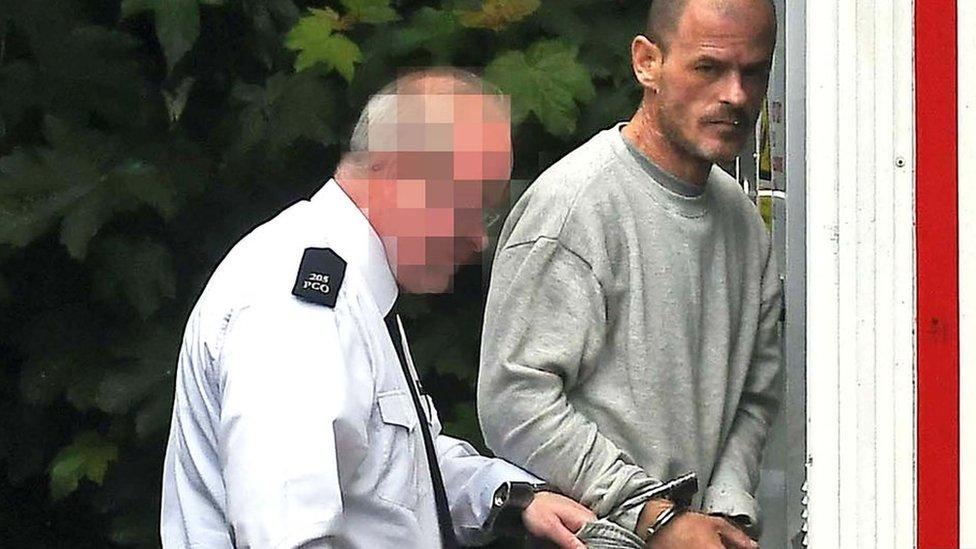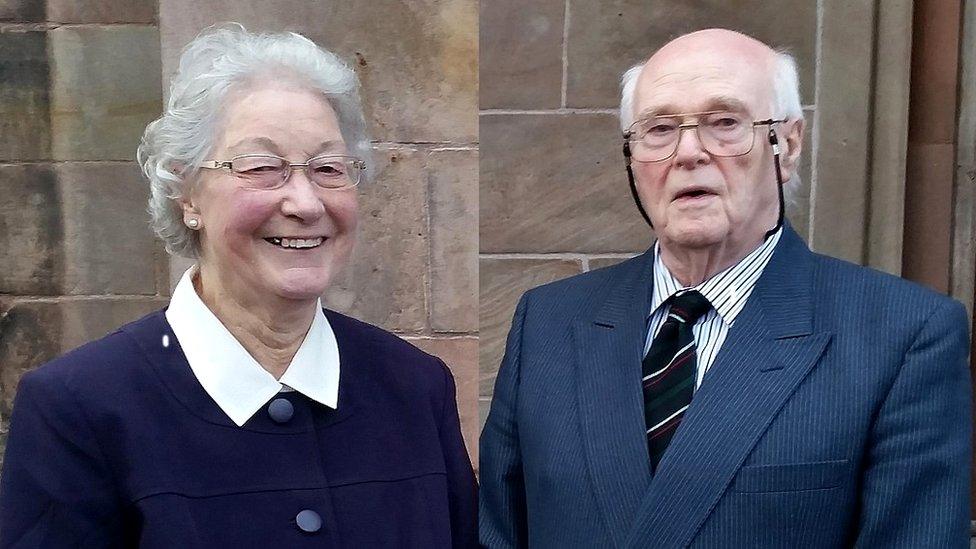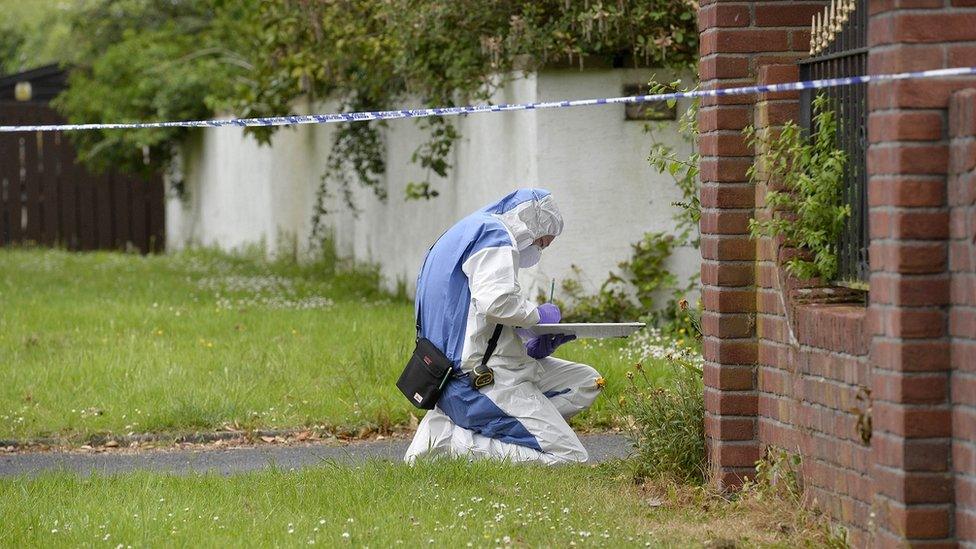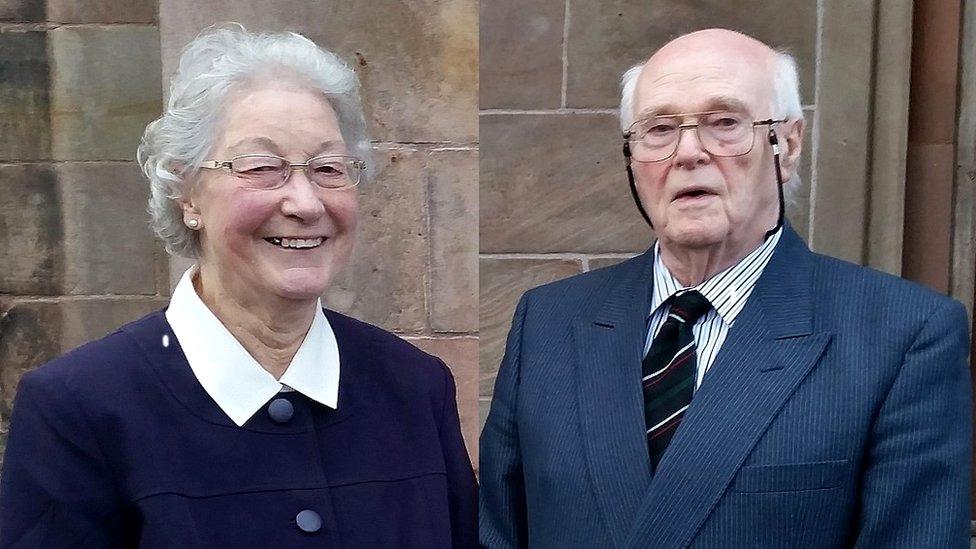Cawdery killings: Medic would have been shocked at killer leaving A&E
- Published

Thomas Scott McEntee at an earlier court hearing
A health practitioner said she would have been shocked that a man who later killed two people was not accompanied by police when taken to hospital.
The senior practitioner told the inquest into the killings of Michael and Marjorie Cawdery she would have been shocked that Thomas Scott McEntee was then allowed to leave hospital.
McEntee, who has paranoid schizophrenia, killed the husband and wife in May 2017.
They were stabbed in their home.
McEntee was sentenced to a minimum of 10 years in prison after pleading guilty to two counts of manslaughter by diminished responsibility.
Senior mental health practitioner Elizabeth Williamson told the inquest she was working at the acute mental health unit at Daisy Hill Hospital in Newry and provided "mental health first aid" to McEntee.
On Thursday the inquest heard police had hit McEntee, pinned him to the ground, handcuffed him, but not arrested him outside Daisy Hill Hospital in Newry.
He killed Mr and Mrs Cawdery, who were 83, later that day.
Ms Williamson said she had no prior knowledge of McEntee, but it was clear to her that he was unwell.

Marjorie and Michael Cawdery were killed in their home in Portadown in 2017
She said she suggested he may need psychiatric intensive care and told paramedics he should be taken to a secure psychiatric facility at Craigavon Area Hospital, rather than the emergency department at Daisy Hill Hospital.
"He was very disturbed, he'd been restrained by police, his behaviour was going to be unpredictable and I did believe after his assessment he would have needed a bed in a secure psychiatric unit or intensive psychiatric care," she said.
Ms Williamson, who has almost 50 years experience in mental health care, said she contacted the Bluestone psychiatric unit at Craigavon to check if there were any beds available, and was told that there were.
However, when asked if she had informed the police of this, she said she "couldn't recall" and conceded that police may not have been aware of this fact.
"My rationale was that the ambulance could take him to Craigavon." Ms Williamson said.
"Because [the ambulance] was going back to Craigavon, he could be assessed physically and psychologically and [decided] if he needed a bed or not."
She added that nobody challenged her on that decision.

Forensic officers examined the house where Mr and Mrs Cawdery were killed in May 2017
For a second consecutive day the question of whether police or medical staff were in charge was asked.
Ms Williamson said that while they were allowed to attend to the mental health of McEntee, she was under the impression police were in charge of the scene and saw her intervention as more of "a good Samaritan role".
'I'd have been shocked'
She was asked what she would have thought had she been told that McEntee wasn't accompanied by the police when he was handed over to the emergency department at Craigavon, and that he had been allowed to leave.
She answered: "I'd have been shocked.
"I expected the police to accompany the paramedics, and stay with the gentleman until he was assessed by the medical team.
"The potential was for him to flare up again, it wasn't safe [for police to leave him]."
'He was getting treatment'
A police officer giving evidence to the inquest was also asked who was in charge of the scene.
Constable McDermott said he felt that the two health professionals were.
"I believed he [McEntee] was getting treatment, and my role was to make sure he didn't abscond from that." said Constable McDermott.
He added that he felt there was no need to arrest McEntee at the time as clear mental health issues superseded any potential criminal offence.
He also said as McEntee was receiving care, there was no need to detain him under the Mental Health Act.
"If there's someone from Daisy Hill looking after him, I don't need to intervene," he said.
Constable McDermott was pressed on the decision not to accompany McEntee into the Emergency Department. He said he asked the ambulance crew if they needed him to come with him, and they said they didn't.
He conceded that in hindsight McEntee should have been detained under the Mental Health Act.
Also giving evidence was Constable Mark Riddell, who first helped to restrain McEntee at Daisy Hill Hospital.
He said it was his understanding that McEntee was going to be taken "straight to the Bluestone [psychiatric unit]", adding this was because the mental health staff were aware of him and he assumed they would refer him there.
When asked who was in charge of the scene, he answered: "I don't know".
He agreed that was "not satisfactory".
The inquest continues.
Related topics
- Published12 June 2023

- Published14 June 2023

- Published28 June 2018

- Published22 June 2018
